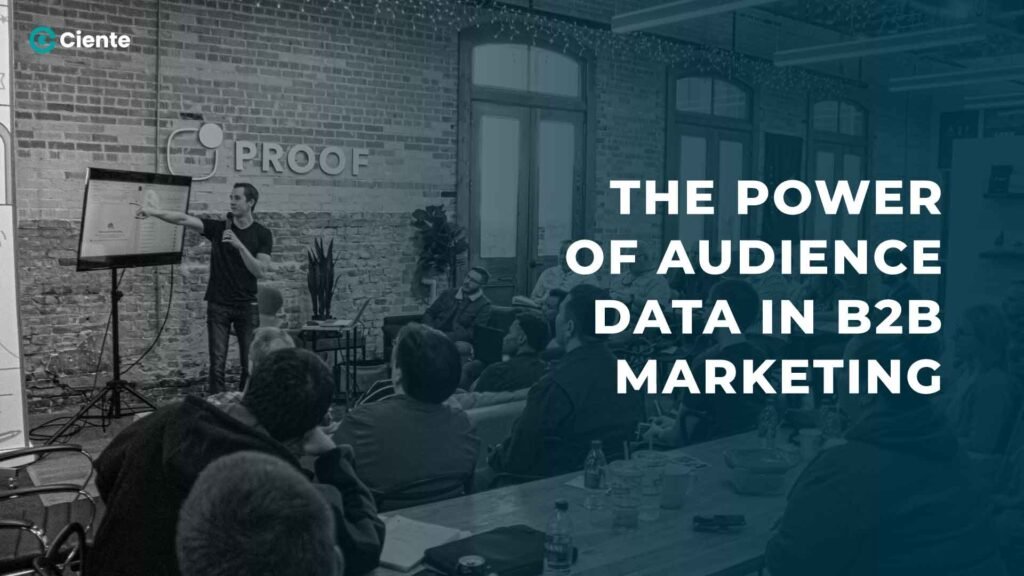Strategic decisions are based on in-depth research and varied inputs. How can you revolutionize your B2B marketing by unleashing the power of data?
In the realm of B2B marketing, understanding your target market is essential. Reaching the right people with the right message at the right time is important. However, how can you be sure you’re doing that? Audience data holds the key.
Making decisions based on data analysis rather than gut or emotion has become second nature in today’s data-driven culture. We have access to a lot more data than before. You shouldn’t assume what your prospects need, want, or have previously looked into. With AI and intent data, it is now feasible to have a far better understanding of certain prospects and to create communications tailored to them.
By utilizing the power of data, you may gain greater insight into your target market, improve business outcomes, and forge closer bonds with customers. This blog walks you through audience data and its importance in B2B marketing.
What is Audience Data?
Without audience data, many of your advertising campaigns and product designs are little more than wild guesses. It’s exceedingly tough to succeed as a business if you don’t know who’s viewing your advertisements, visiting your website, or purchasing your goods. You can choose more wisely when it comes to branding, marketing, and other factors if you know as much as you can about your audience.
Audience data covers the specific information available about customers and potential clients. It can include intent, interests, past purchases, product ownership, demography, brand affinities, education, firmographics, and employment. Given the expanding sophistication of account-based marketing capabilities, audience data is becoming more important for B2B businesses.
Importance of Audience Data for B2B Marketing
Enhanced Targeting
By gathering and analyzing audience data, B2B marketers may pinpoint the precise businesses and decision-makers who are most likely to be interested in their goods or services. As a result, there is less chance of squandering money on fruitless marketing initiatives because they can now design more targeted and successful campaigns.
Improved Segmentation
Marketers are constantly seeking methods to segment their audiences better. Data enrichment makes it feasible for you to completely utilize the potential of audience segmentation by enabling you to better understand your clients. Businesses can create new segments using the additional information that comes with a consolidated audience data set. A competitive advantage comes from better segmentation.
Increased Personalization
Audience data is used to personalize and make marketing messages and content more valuable and appealing to target audiences. B2B marketers can raise the possibility that their target audience will interact with their brand by offering pertinent information and solving particular pain points.
Lead Generation
Marketers can generate leads and identify prospective clients who are most likely interested in a company’s goods or services using audience data. B2B marketers can discover prospective clients and develop focused marketing programs to nurture those leads through the sales funnel by analyzing data such as website behavior, social media activity, and search history.
Improved Customer Experience
B2B marketers can better understand the requirements and desires of their target audience by analyzing audience data. This data guides product development as well as marketing and advertising tactics, assisting companies in producing goods and services that are better suited to the demands of their target market.
Greater ROI
B2B marketers can boost return on investment for their marketing initiatives by using audience data to develop more focused and successful marketing campaigns. They can produce more leads and, eventually, increase their company’s revenue by speaking to the right individuals and conveying the correct message.
Better Customer Retention
B2B marketers can better understand their clients with audience data to develop more successful retention tactics. Marketers can find opportunities to increase customer loyalty and improve customer satisfaction by analyzing consumer behavior and preferences. Identifying upselling opportunities and unexplored ways to boost revenue among your existing clients with access to high-quality audience data is simpler.
Final Word
In B2B marketing, leveraging data has emerged as a game-changer, offering a way to develop personalized experiences that boost customer engagement and satisfaction. When used properly, data may provide insights that not only meet but frequently surpass customer expectations, resulting in a better connection that benefits both parties. This ultimately fuels explosive growth, which translates to achieving business success. Embrace the potential of B2B data and change the way you do business in this dynamic and ever-evolving industry.

